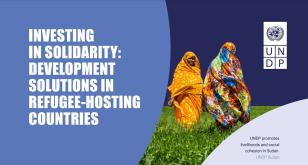Investing in Solidarity: Development Solutions in Refugee-Hosting Countries

Investing in Solidarity: Development Solutions in Refugee-Hosting Countries
December 22, 2023
Forced displacement is trapping millions of people in poverty, feeding xenophobia and holding back progress on sustainable development. In 2018, the Global Compact on Refugees set out a blueprint for governments, international organizations and other stakeholders to transform the way the world responds to refugee situations, benefiting both refugees and the communities that host them. While gains have been made, greater international cooperation is needed to implement the Global Compact’s objectives and find long-term solutions to the obstacles that are hindering progress.
Host countries are providing refuge and asylum for longer periods or even indefinitely, while addressing development challenges of their own. Recognizing this, the United Nations Development Programme (UNDP) is committed to investing in development for refugees, returnees and host communities. Building on its engagements with governments in host countries, humanitarian, development and peace partners, UNDP will scale up action on reducing, resolving and preventing forced displacement.
To respond to the needs for stepped-up development investment in situations of forced displacement, UNDP will:
1. Strengthen national/local capacities for coordination and management, service delivery, livelihoods and job creation, access to justice and social cohesion.
2. Promote increased access to development financing for host countries, including through Integrated National Financing Frameworks.
3. Address the drivers of forced displacement and expand work in peacebuilding, including conflict, violence and aggravating effects of climate change.
UNDP will mainstream age, gender and diversity in all its work on forced displacement by promoting gender equality and the economic empowerment of women, and fighting against racism, xenophobia and discrimination.

 Locations
Locations


